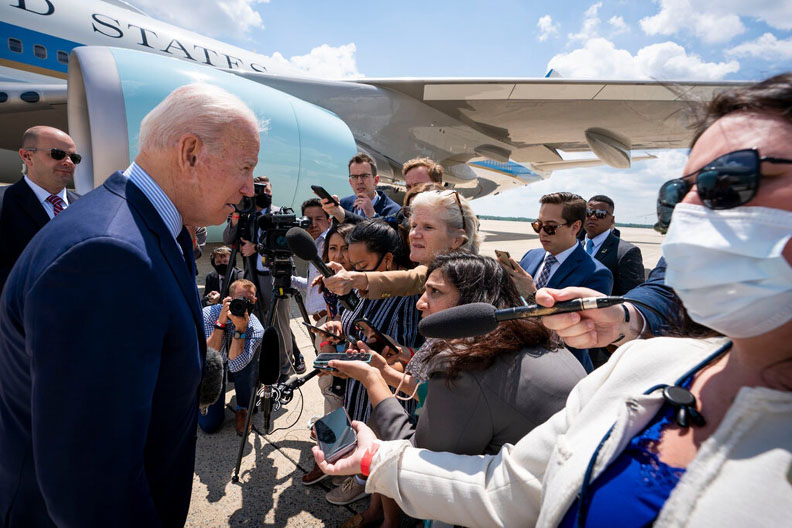Ravi Batra Applauds Biden for the Initiative
WASHINGTON (TIP): New York based attorney Ravi Batra appeared to feel vindicated after President Biden called for a 90-day sprint to understand the origins of the coronavirus pandemicwhich came after intelligence officials told the White House that they had a raft of still-unexamined evidence that required additional computer analysis that might shed light on the mystery, according to senior administration officials. Ravi Batra smelt a rat long ago and wrote an open letter to President Trump pointing an accusing finger at China being responsible for the leak of Coronavirus from Wuhan Laboratory, and asking for an investigation. After Biden took over, Ravi Batra wrote him an open letter repeating his accusation.
When The Indian Panorama called Ravi Batra for his reaction to the investigation news, he said: “I heartily welcome and celebrate President Biden’s command to our intelligence community to investigate the origin of Covid19. Roots are important not only to Alex Haley, but to biochemists and epidemiologists the world over to understand the nooks and crannies of this pandemic virus so as to more perfectly vaccinate against it and to ultimately disarm it. This is a deadly Virus-ICBM, and a crime against humanity.” The New York Times which broke the story said that the officials declined to describe the new evidence. But the revelation that they are hoping to apply an extraordinary amount of computer power to the question of whether the virus accidentally leaked from a Chinese laboratory suggests that the government may not have exhausted its databases of Chinese communications, the movement of lab workers and the pattern of the outbreak of the disease around the city of Wuhan.
In addition to marshaling scientific resources, Mr. Biden’s push is intended to prod American allies and intelligence agencies to mine existing information — like intercepts, witnesses or biological evidence — as well as hunt for new intelligence to determine whether the Chinese government covered up an accidental leak.
Mr. Biden committed on Thursday, May 27, to making the results of the review public, but added a caveat: “unless there’s something I’m unaware of.”
His call for the study has both domestic and international political ramifications. It prompted his critics to argue that the president had dismissed the possibility that the lab was the origin until the Chinese government this week rejected allowing further investigation by the World Health Organization. And, administration officials said, the White House hopes American allies will contribute more vigorously to a serious exploration of a theory that, until now, they considered at best unlikely, and at worst a conspiracy theory.
The White House is hoping that allies and partners can tap their networks of human sources to find additional information about what happened inside the laboratory. While the United States has been rebuilding its own sources in China, it has still not fully recovered from the elimination of its network inside the country a decade ago. As a result, having allies press their informants about what went on inside the Wuhan Institute of Virology will be a key part of the intelligence push ahead. The inquiry has not reached a dead end, a senior Biden administration official said. Officials would not describe the kind of computational analysis they want to do.
Administration and intelligence officials say it will be as much the work of scientists as spies in trying to unravel how the pandemic was unleashed. The Biden administration has been working to improve its scientific expertise on the National Intelligence Council. Senior officials have told the spy agencies that their science-oriented divisions, which have been working on the issue for months, will play a prominent role in the revitalized inquiry.
The new inquiry will also tap the national labs and other scientific resources of the federal government that previously have not been directly involved in the intelligence effort, the senior administration official said.
Like scientists and the broader public, the intelligence community remains uncertain about the origins of the coronavirus. No definitive intelligence has emerged, and some current and former officials expressed caution that much more can be gathered in 90 days. While the Office of the Director of National Intelligence will deliver a report before summer’s end, the inquiry will most likely have to be extended.
Current officials say the central goal of the new intelligence push is to improve preparations for future pandemics. As a result, Mr. Biden’s message this week was calibrated to leave open the possibility of future cooperation with China.
The White House’s frustration with China has risen after its announcement this week that Beijing would not participate in additional investigations by the World Health Organization. A Biden administration official said if the new inquiry failed to yield an answer, it would be because China had not been transparent.
But the administration is not trying to isolate China, and instead attempting to walk a careful line between pressuring Beijing to cooperate and demonstrating that in its absence, the United States will intensify its own investigation.
Administration officials also believe the new inquiry and Chinese obstruction of the World Health Organization will create the opportunity for stepped-up intelligence cooperation with allies.
Allies have been providing information since the beginning of the pandemic, one official said. But some, including British intelligence services, have been skeptical of the lab leak theory. Others, including Australia, have been more open to it.
In a statement on Thursday, Amanda J. Schoch, the spokeswoman for the Office of the Director of National Intelligence, said the intelligence agencies had come together around the two likely scenarios, but there were so far no high-confidence assessments of the virus’s origins.
“The U.S. intelligence community does not know exactly where, when or how the Covid-19 virus was transmitted initially,” Ms. Schoch said.
The intelligence community “continues to examine all available evidence, consider different perspectives, and aggressively collect and analyze new information to identify the virus’s origins,” Ms. Schoch said.
(With excerpts from The New York Times)
